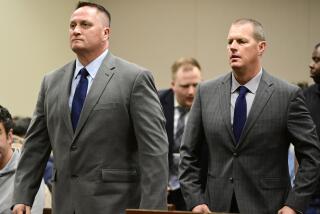Scores of Convictions Reviewed as Chemist...
- Share via
CHARLESTON, W.Va. — Fred Zain, a police chemist whose expert testimony and lab tests helped put scores of rapists and murderers behind bars in two states over 13 years, now finds himself in the dock.
Zain is charged with lying in court and tampering with evidence in his laboratories, compelling judges in West Virginia and Texas to release men sent to prison on the strength of blood and semen samples Zain verified.
“I really have no idea why he did what he did,” said Jack Buckalew, a former superintendent of the West Virginia State Police. “The only possible reason I can speculate on is to enhance his status with prosecutors by saying what he thought they wanted him to say.”
Zain, 43, surrendered on Aug. 4 in Hondo, Tex., to answer charges of aggravated perjury, evidence tampering and fabrication connected to the 1990 rape conviction of Gilbert Alejandro.
“I think there’s no criminal intent,” said attorney Sam Bayless.
Zain refused to talk to reporters and left Medina County Jail after posting $6,000 bond. Trial is scheduled for Oct. 12.
Zain worked as a serologist for the West Virginia State Police from 1980 to 1989. He resigned to become chief of physical evidence for the medical examiner in Bexar County, Tex.
Texas has freed two men convicted on now-disproven blood tests done by Zain: Alejandro, who served four years of a 12-year sentence, and Jack W. Davis, convicted of murder in 1990.
Davis missed a death sentence by the vote of one juror and is suing Zain for $10 million. After Davis’ conviction, Zain changed his testimony about blood at the scene of a teacher’s mutilation-murder, acknowledging the blood came from the victim rather than Davis.
Zain’s work or testimony figures in hundreds of other Texas cases, and authorities say they will review each one.
In West Virginia, Zain is accused of lying about his credentials and about performing specific lab tests in a 1991 double-murder trial.
Seventy-one convictions, all but five of them for murder or rape, were granted reviews because of Zain’s “long history of falsifying evidence in criminal prosecutions,” according to a report presented to the West Virginia Supreme Court last year. Lower courts have rejected 25 appeals, but one man was freed and at least three, including a father and son convicted in a rape, have been granted retrials because of Zain’s allegedly false testimony.
Suspicions about Zain’s work first surfaced publicly in 1992, when tests he had performed five years earlier figured prominently in the dismissal of two rape convictions against Glen Dale Woodall, a Huntington cemetery worker.
Although Woodall’s innocence was chiefly confirmed through DNA semen tests that were not allowed at his 1987 trial, a subsequent check of non-DNA trial evidence showed a strong probability that he was convicted on tainted information from Zain, authorities said.
Zain had testified, for example, that it was “highly unlikely” a hair found in one rape victim’s borrowed car could have come from any source but Woodall’s blond beard. But a written report from March, 1987, three months before the trial, shows Zain initially described the sample as a pubic hair and never bothered to compare it to hair from the man who owned the car.
When freed, Woodall had served five years of a sentence of two life terms plus 335 years. The state paid him $1 million in compensation, the maximum allowed by law.
A panel appointed by the state Supreme Court found that Zain, at numerous trials, fabricated or altered evidence and lied about academic qualifications under oath.
The panel’s report said Zain was routinely “overstating the strength of results, overstating the frequency of genetic matches . . . reporting inconclusive results as conclusive, repeatedly altering laboratory records . . . implying a match with a suspect when testing supported only a match with the victim, and reporting scientifically impossible or improbable results.”
It also said Zain’s supervisors may have “ignored or concealed complaints” about his laboratory work.
Even after Zain had moved to San Antonio, West Virginia prosecutors continued to seek him out to analyze evidence because his results were more favorable than those obtained by his successors, according to George Castelle, a Charleston public defender.
“After Zain left, the lab sometimes couldn’t make any determinations, or the defendant would come within 40% of the population, whereas Zain always gave better probabilities because he faked evidence,” Castelle said.
Amid the criticism of his role in the Woodall case, Zain was fired from the Texas job in July, 1993, and left the state. A source involved in the Zain investigation says the chemist was dismissed for losing evidence; Bexar County Medical Examiner Vincent DiMaio failed to return multiple phone calls from the Associated Press seeking clarification of the firing.
In neither state, however, were officials zealous about checking Zain’s background or, once alerted to possible blunders, in investigating their investigator.
Zain graduated from West Virginia State College with a C average. His transcript shows he flunked some chemistry classes and barely passed others. In court, Zain often testified he majored in biology and minored in chemistry; the transcript shows only the biology major.
Kenneth Blake, then-director of the state police’s Criminal Identification Bureau, said he never questioned Zain’s academic background when recommending him for the state police job.
“I did neighborhood and criminal background checks,” said Blake, who now heads the criminology department at Zain’s alma mater. “Any interviewing for his academic qualifications was done by the people who headed the lab.”
Ray Barber, lab chief at the time, said he felt no need to check Zain’s credentials because Zain had a “lab background” as a chemist with the state Department of Natural Resources.
In 1985, two fellow lab workers told superiors they had seen Zain record results from blank test plates. The court panel said state police investigators looked into the allegations and dismissed them as an office squabble.
“They didn’t like Zain, and Zain didn’t like them,” Blake said of that time. “But we never had any complaints from prosecutors, defense attorneys or investigators.”
The report also cited an internal state police audit of August, 1992, indicating Zain had falsified test results or lied about performing certain tests as early as September, 1986. But when a special prosecutor appointed by the court to investigate Zain asked the police superintendent about the chemist, Buckalew told him there was “no need to take any further action.”
Interviewed in early August, Buckalew said he was “satisfied” no one was wrongly jailed as a result of Zain’s work.
More to Read
Sign up for Essential California
The most important California stories and recommendations in your inbox every morning.
You may occasionally receive promotional content from the Los Angeles Times.













